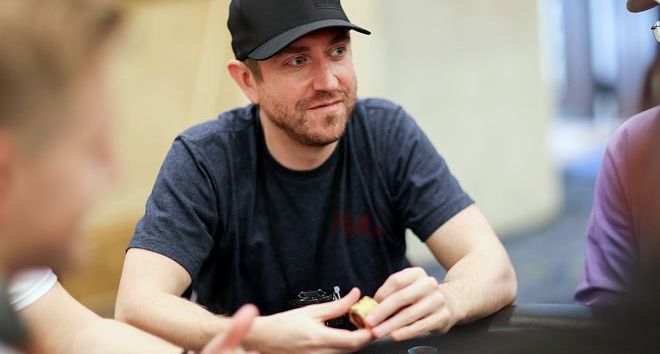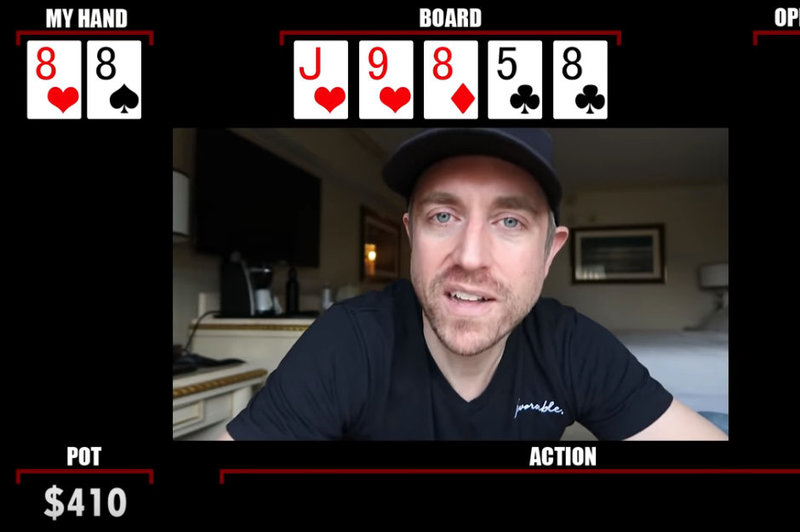






Q&A: Andrew Neeme Talks About Creating Optimal Environment At The Poker TableVlogger And Cash Game Pro Tells Other Regs To 'Lead By Example' At The Table |
|
|

Over the last couple of years, Andrew Neeme has built a high profile in the poker world just by chronicling his journey as a mid- and high-stakes cash game professional. His vlogs on his YouTube channel document his sessions playing $2-$5 and $5-$10 no-limit hold’em around his home city of Las Vegas, as well as other parts of the United States, and even sometimes abroad.
Neeme’s content quickly caught the eye of some of poker’s most influential players. Last October, he signed on to be a part of Jason Somerville’s Team Run It Up. Since then, he has branched out from YouTube to other content platforms, including live streaming on Twitch.
In an era where one of the major debates in the game revolves around which parts of their face players should be allowed to conceal, poker is in danger of becoming less fun, and even more predatory. Having made his living on the live cash game felt for the past decade, Neeme knows exactly how to create the perfect environment at the poker table.
Card Player caught up with Neeme to discuss how poker players can do a better job of keeping their customers happy.
Steve Schult: What do you consider an ideal cash game to be? What are you looking for when you are sizing up a table and what type of action do you prefer?
Andrew Neeme: For me personally, I like a wild and crazy table. I want to see lots of multi-way flops, big opening raise sizes, wide ranges, etc. The more cocktails on the table and banter between the players, the better. But I certainly don’t mind a loose/passive game.
I can adjust my approach between the two plus EV (expected value) situations. Continuation-bet smaller and frequently on the passive table, and raise and bet bigger, mainly for value, while pushing your equity with nut flush draws on the crazy tables. Give up more frequently with bluffs and happily show them down on the rare occasions you decide to take one all the way.
SS: If you do sit in a game that isn’t ideal, what are some things you’ll do to try and create more favorable game conditions?
AN: I think straddling is the simplest of actions you can take. You don’t need permission, and while of course, it helps if others partake too, doing so yourself can help create some bigger pots and more action, both of which is more fun and interesting. Sometimes, I’ll encourage the person who won my straddle hand to straddle themselves, since that seems fair. But to be honest, I’m not one for peer pressure. The most I might say is “round of straddles?’ as I’m putting in my own straddle, but I won’t push anyone individually.
I know other regs who push a little harder to get the straddles going, or will order a beer and ask if anyone else wants anything. I think that’s cool, but I also don’t think people should be pressured into any activity they didn’t sign up for at the front podium. Maybe that’s lame of me.
Just make sure to always engage in conversation when someone else wants to chat. You don’t need to be the life of the party, and I’m often quiet on quiet tables. But if someone strikes up a conversation with me, let’s engage.

SS: There are always players that are going to be bad for the game, not necessarily for their style of play, but just because of their overall attitude. How do you get them to change that attitude and have a good time at the table?
AN: It depends on what they’re doing exactly that’s a drag. If someone is watching a movie with headphones on, I might make a comment about how I don’t want to give ‘the movie guy’ action when he raises. I’ll say it with a smile though. Like, ‘Shit, he promised Roger Ebert he’d come through with these regular movie reviews. Give the guy a break.’
I’m not trying to make people angry at them. I’m just being honest. Personally, I think you should be able to enjoy yourself in whatever way you see fit at the poker table, as long as you aren’t slowing the game down or generally being a jerk. If, however, they are being a jerk in some fashion, then it’s time to call them out directly and let them know it’s not cool.
SS: It’s hard to quantify, but how much can these maneuvers increase a live player’s win rate?
AN: Game selection is going to be a big determinant of your profitability. If you get eight, near-GTO (game theory optimal) robots playing against each other with one recreational player, each of their presence will diminish everyone’s return. So, the flip side of that is people disregarding GTO and just start splashing around, having a good time, and not worrying about how well their ranges are created.
It’ll affect me to some degree. I’m not so clueless as to think a straddle is immediately plus EV for me. It’s all going to show an uptick in the variance department, which means bigger wins and bigger losses, but still relatively close to the same ratio of the two results.
SS: It seems as if tournament players are much less concerned with the environment they are creating. You’ve begun to dabble in tournaments more over the last 12 months. Why is this the case and is it more or less important to create an enjoyable atmosphere in tournaments?
AN: I think it’s still important in tournaments, but it’s less of an issue for a couple of reasons. I think regs are less worried about it because there are no table changes in tourneys, so the person whose experience you’re diminishing can’t immediately do anything about it.
Also, tournament fields are so recreational-player heavy that the pool seems way more healthy. People love the story that a tournament naturally creates when there’s a beginning, middle, and end. Whereas in a cash game, it can be monotonous to some people if you let it become so.
But yeah, small- and mid-stakes tournaments are popular as ever, as far as I know, whereas in mid-stakes cash games, in Vegas particularly, you might see a tumbleweed blow across your table and not be surprised.

SS: What about berating players at the table? This seems to be a common occurrence in small-stakes games where there can be a wide gap in skill discrepancy. Does it still happen at some of the higher stakes? How do you combat it?
AN: Aside from outright threats or harassment, I think this is the worst type of behavior. I have no tolerance for this nonsense and will pretty much always tell the offending reg to get a grip. It happens less so at higher stakes because you have to reign in your ego if you want to be successful in this endeavor.
That and higher-stakes regs have come to realize this. And a reg losing to a rec can affect the ego, hence this sort of behavior. There are also more regs to call you out immediately at the higher stakes for being an idiot if you berate others. On a lower-stakes table, less people know just how idiotic that is and instead shrink into tightness and quietness.
SS: What are other common situations at the table that lend itself to a poor atmosphere? What are some of the things players can do to combat them?
AN: I think the obvious situations – particularly multi-tasking on your phone – are by far the most common. The thing is that when you’re in a tough and saturated market, I don’t think it’s realistic to expect your other market participants, and really your competitors, to behave in a certain way. I think it’ll require a shift in how the marketplace is presented. From my perspective, I think that could mean a couple of ideas.
One would be a shift away from the same sort of offering that every room provides. A two-blind, nine-handed no-limit hold’em game. There are a number of tweaks you can make there including the number of blinds and antes, the number of seats at the table, the game itself. We’re seeing people testing the waters with short deck, which I personally think would be fun for everyone to try and play, but who knows if that’ll be the game that makes a difference. I just don’t think that with all of the information available now on how to profitably play this format that it can continue in an enjoyable fashion without some tweaks.
Another suggestion is the idea of a hosted game. Poker rooms have very similar promotions across the board. High hand jackpots, bad beat jackpots, etc. That stuff is fun for a lot of people, but why not outsource your promotion further and have some streamers and vloggers and Instagrammers run a game? People are more willing to try all sorts of various twists and turns when it feels like a home game.
Things like bomb pots, straddles, a round of PLO, a $50 flip. A host can sort of provide that sense of a home game when his or her players are familiar with their personality, and really inject some life into a poker room.
If you’re a customer of the poker room and you’re just looking to have fun at the table while you grind, I say lead by example.
Photo credit: Carlos Monti / PokerStars.
